All Posts (6434)


 Big Isle residents voice opinions on SuperferryBy Rod Thompson, Star Bulletin, 25 March 2008Concerns for whales resurface at a hearing for an environmental impact statementHILO » With the Hawaii Superferry not scheduled to come to the west side of the Big Island until 2009 and not to the Hilo side at all, only 15 people commented yesterday at a public meeting on an environmental study for the vessel.Five people spoke at an afternoon session at the Hilo High School Auditorium on topics that should be considered in the environmental impact statement, followed by 10 people at the evening session.Meeting facilitator Mike Mitrano said the meeting format did not call for any official to answer questions from the public. But he told the Star-Bulletin that environmental study consultant Belt Collins Hawaii Ltd. would use all questions and comments to identify issues that need to be considered.John Ota was not satisfied by company statements that two observers would be posted as whale lookouts on voyages year-round."The only time any observer is going to see a whale is when the tail sticks up above the surface," he said.A company statement said the ferry will lower its speed from its normal 35 knots when it encounters groups of whales.Jasper Moore, a candidate for Big Island mayor, said creating a new pier at Kawaihae Harbor is "unacceptable." The money would be better spent on health care, he said.Krisztina Samu commented that company official Terry O'Halloran had already admitted that on three occasions the vessel Alakai had come within 100 meters -- about 110 yards -- of whales.O'Halloran said that is true, but whenever such close approaches occur, the ship takes evasive action.A company statement said the company is committed to staying 500 meters, or 550 yards, away from whales and will report any instance of a close approach to the state.Peace activist Jim Albertini asked about protection of natural resources, such as off-island shipment of hapuu ferns cut from native forests.The company says it worked for more than a year with the state Department of Agriculture to create policies that are stricter than the law requires.The company will be the only one in interisland transportation that will do an agricultural screening of every passenger, the company said.Al Beamer said he was "strongly in favor" of the Superferry to help farmers get products to market in Honolulu.
Big Isle residents voice opinions on SuperferryBy Rod Thompson, Star Bulletin, 25 March 2008Concerns for whales resurface at a hearing for an environmental impact statementHILO » With the Hawaii Superferry not scheduled to come to the west side of the Big Island until 2009 and not to the Hilo side at all, only 15 people commented yesterday at a public meeting on an environmental study for the vessel.Five people spoke at an afternoon session at the Hilo High School Auditorium on topics that should be considered in the environmental impact statement, followed by 10 people at the evening session.Meeting facilitator Mike Mitrano said the meeting format did not call for any official to answer questions from the public. But he told the Star-Bulletin that environmental study consultant Belt Collins Hawaii Ltd. would use all questions and comments to identify issues that need to be considered.John Ota was not satisfied by company statements that two observers would be posted as whale lookouts on voyages year-round."The only time any observer is going to see a whale is when the tail sticks up above the surface," he said.A company statement said the ferry will lower its speed from its normal 35 knots when it encounters groups of whales.Jasper Moore, a candidate for Big Island mayor, said creating a new pier at Kawaihae Harbor is "unacceptable." The money would be better spent on health care, he said.Krisztina Samu commented that company official Terry O'Halloran had already admitted that on three occasions the vessel Alakai had come within 100 meters -- about 110 yards -- of whales.O'Halloran said that is true, but whenever such close approaches occur, the ship takes evasive action.A company statement said the company is committed to staying 500 meters, or 550 yards, away from whales and will report any instance of a close approach to the state.Peace activist Jim Albertini asked about protection of natural resources, such as off-island shipment of hapuu ferns cut from native forests.The company says it worked for more than a year with the state Department of Agriculture to create policies that are stricter than the law requires.The company will be the only one in interisland transportation that will do an agricultural screening of every passenger, the company said.Al Beamer said he was "strongly in favor" of the Superferry to help farmers get products to market in Honolulu...This video investigates the potential negative effects of the coming Hawaii Superferry on Endangered Humpback whales in Hawaiian waters. ... all » The humpback whale were listed as “endangered” under the Endangered Species Act, and are considered “depleted” under the Marine Mammal Protection Act. Humpback whales are the fourth most numerically depleted large cetacean worldwide.The Hawaii Superferry will be far more of a threat to whales then is generally realized and government officials should take a very close look before permitting it to go into operation. Specifically, the Hawaii Superferry will be a threat to mother and baby Humpback whales because it’s two Pontoons extend down to at least 14 feet. Mother and baby whales swim just below the surface. About 400 mother and baby whales currently winter in Hawaiian waters. The use of radar and other technologies will be only marginally effective because they cannot detect whales beneath the surface and only sonar can “see” underwater and sonar will not be useful on the Superferry.The Superferry can do almost 43 miles/hour which means it can cover over 2 football fields in 10 seconds. Other high speed ferries – built by the same company – have recently killed many Sperm whales in the Canary Islands.
Mahalo: Nini'ane and Vance... what a goddamned circusII
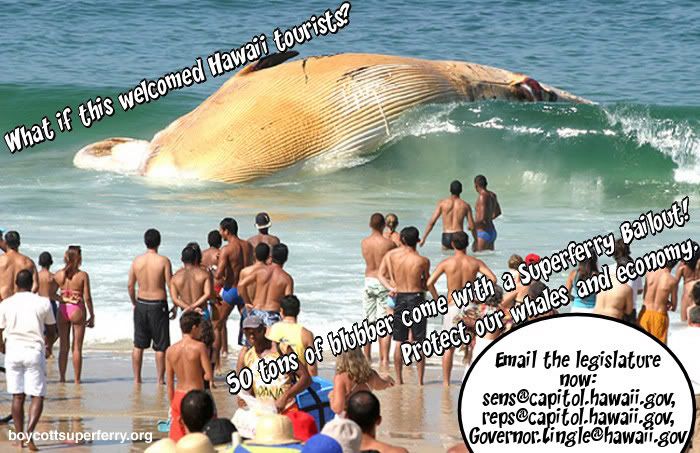
Moketananda wants to share a video with you
Video Description
Hawaiians protest of the taping of a movie of their beloved Princess Ka'iulani at the Palace. The scene of the crime in 1893. The crime continues
Personal Message
yikes
To accept my friend request, click here.
To respond to Moketananda, click here.
Thanks,
Moketananda
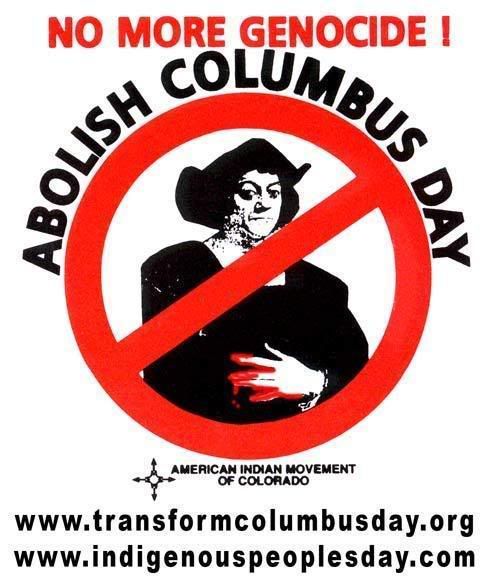

 Five Hundred Years of Injustice:The Legacy of Fifteenth Century Religious Prejudiceby Steve NewcombWhen Christopher Columbus first set foot on the white sands of Guanahani island, he performed a ceremony to "take possession" of the land for the king and queen of Spain, acting under the international laws of Western Christendom. Although the story of Columbus' "discovery" has taken on mythological proportions in most of the Western world, few people are aware that his act of "possession" was based on a religious doctrine now known in history as the Doctrine of Discovery. Even fewer people realize that today - five centuries later - the United States government still uses this archaic Judeo-Christian doctrine to deny the rights of Native American Indians.Origins of the Doctrine of DiscoveryTo understand the connection between Christendom's principle of discovery and the laws of the United States, we need to begin by examining a papal document issued forty years before Columbus' historic voyage In 1452, Pope Nicholas V issued to King Alfonso V of Portugal the bull Romanus Pontifex, declaring war against all non-Christians throughout the world, and specifically sanctioning and promoting the conquest, colonization, and exploitation of non-Christian nations and their territories.Under various theological and legal doctrines formulated during and after the Crusades, non-Christians were considered enemies of the Catholic faith and, as such, less than human. Accordingly, in the bull of 1452, Pope Nicholas directed King Alfonso to "capture, vanquish, and subdue the saracens, pagans, and other enemies of Christ," to "put them into perpetual slavery," and "to take all their possessions and property." [Davenport: 20-26] Acting on this papal privilege, Portugal continued to traffic in African slaves, and expanded its royal dominions by making "discoveries" along the western coast of Africa, claiming those lands as Portuguese territory.Thus, when Columbus sailed west across the Sea of Darkness in 1492 - with the express understanding that he was authorized to "take possession" of any lands he "discovered" that were "not under the dominion of any Christian rulers" - he and the Spanish sovereigns of Aragon and Castile were following an already well-established tradition of "discovery" and conquest. [Thacher:96] Indeed, after Columbus returned to Europe, Pope Alexander VI issued a papal document, the bull Inter Cetera of May 3, 1493, "granting" to Spain - at the request of Ferdinand and Isabella - the right to conquer the lands which Columbus had already found, as well as any lands which Spain might "discover" in the future.In the Inter Cetera document, Pope Alexander stated his desire that the "discovered" people be "subjugated and brought to the faith itself." [Davenport:61] By this means, said the pope, the "Christian Empire" would be propagated. [Thacher:127] When Portugal protested this concession to Spain, Pope Alexander stipulated in a subsequent bull - issued May 4, 1493 - that Spain must not attempt to establish its dominion over lands which had already "come into the possession of any Christian lords." [Davenport:68] Then, to placate the two rival monarchs, the pope drew a line of demarcation between the two poles, giving Spain rights of conquest and dominion over one side of the globe, and Portugal over the other.During this quincentennial of Columbus' journey to the Americas, it is important to recognize that the grim acts of genocide and conquest committed by Columbus and his men against the peaceful Native people of the Caribbean were sanctioned by the abovementioned documents of the Catholic Church. Indeed, these papal documents were frequently used by Christian European conquerors in the Americas to justify an incredibly brutal system of colonization - which dehumanized the indigenous people by regarding their territories as being "inhabited only by brute animals." [Story:135-6]The lesson to be learned is that the papal bulls of 1452 and 1493 are but two clear examples of how the "Christian Powers," or "different States of Christendom," viewed indigenous peoples as "the lawful spoil and prey of their civilized conquerors." [Wheaton:270-1] In fact, the Christian "Law of Nations" asserted that Christian nations had a divine right, based on the Bible, to claim absolute title to and ultimate authority over any newly "discovered" Non-Christian inhabitants and their lands. Over the next several centuries, these beliefs gave rise to the Doctrine of Discovery used by Spain, Portugal, England, France, and Holland - all Christian nations.The Doctrine of Discovery in U.S. LawIn 1823, the Christian Doctrine of Discovery was quietly adopted into U.S. law by the Supreme Court in the celebrated case, Johnson v. McIntosh (8 Wheat., 543). Writing for a unanimous court, Chief Justice John Marshall observed that Christian European nations had assumed "ultimate dominion" over the lands of America during the Age of Discovery, and that - upon "discovery" - the Indians had lost "their rights to complete sovereignty, as independent nations," and only retained a right of "occupancy" in their lands. In other words, Indians nations were subject to the ultimate authority of the first nation of Christendom to claim possession of a given region of Indian lands. [Johnson:574; Wheaton:270-1]According to Marshall, the United States - upon winning its independence in 1776 - became a successor nation to the right of "discovery" and acquired the power of "dominion" from Great Britain. [Johnson:587-9] Of course, when Marshall first defined the principle of "discovery," he used language phrased in such a way that it drew attention away from its religious bias, stating that "discovery gave title to the government, by whose subject, or by whose authority, the discovery was made, against all other European governments." [Johnson:573-4] However, when discussing legal precedent to support the court's findings, Marshall specifically cited the English charter issued to the explorer John Cabot, in order to document England's "complete recognition" of the Doctrine of Discovery. [Johnson:576] Then, paraphrasing the language of the charter, Marshall noted that Cabot was authorized to take possession of lands, "notwithstanding the occupancy of the natives, who were heathens, and, at the same time, admitting the prior title of any Christian people who may have made a previous discovery." [Johnson:577]In other words, the Court affirmed that United States law was based on a fundamental rule of the "Law of Nations" - that it was permissible to virtually ignore the most basic rights of indigenous "heathens," and to claim that the "unoccupied lands" of America rightfully belonged to discovering Christian European nations. Of course, it's important to understand that, as Benjamin Munn Ziegler pointed out in The International Law of John Marshall, the term "unoccupied lands" referred to "the lands in America which, when discovered, were 'occupied by Indians' but 'unoccupied' by Christians." [Ziegler:46]Ironically, the same year that the Johnson v. McIntosh decision was handed down, founding father James Madison wrote: "Religion is not in the purview of human government. Religion is essentially distinct from civil government, and exempt from its cognizance; a connection between them is injurious to both."Most of us have been brought up to believe that the United States Constitution was designed to keep church and state apart. Unfortunately, with the Johnson decision, the Christian Doctrine of Discovery was not only written into U.S. law but also became the cornerstone of U.S. Indian policy over the next century.From Doctrine of Discoveryto Domestic Dependent NationsUsing the principle of "discovery" as its premise, the Supreme Court stated in 1831 that the Cherokee Nation (and, by implication, all Indian nations) was not fully sovereign, but "may, perhaps," be deemed a "domestic dependent nation." [Cherokee Nation v. Georgia] The federal government took this to mean that treaties made with Indian nations did not recognize Indian nations as free of U.S. control. According to the U.S. government, Indian nations were "domestic dependent nations" subject to the federal government's absolute legislative authority - known in the law as "plenary power." Thus, the ancient doctrine of Christian discovery and its subjugation of "heathen" Indians were extended by the federal government into a mythical doctrine that the U.S. Constitution allows for governmental authority over Indian nations and their lands. [Savage:59-60]The myth of U.S. "plenary power" over Indians - a power, by the way, that was never intended by the authors of the Constitution [Savage:115-17] - has been used by the United States to:Circumvent the terms of solemn treaties that the U.S. entered into with Indian nations, despite the fact that all such treaties are "supreme Law of the Land, anything in the Constitution notwithstanding."Steal the homelands of Indian peoples living east of the Mississippi River, by removing them from their traditional ancestral homelands through the Indian Removal Act of 1835.Use a congressional statute, known as the General Allotment Act of 1887, to divest Indian people of some 90 million acres of their lands. This act, explained John Collier (Commissioner of Indian Affairs) was "an indirect method - peacefully under the forms of law - of taking away the land that we were determined to take away but did not want to take it openly by breaking the treaties."Steal the sacred Black Hills from the Great Sioux nation in violation of the 1868 Treaty of Fort Laramie which recognized the Sioux Nation's exclusive and absolute possession of their lands.Pay the Secretary of the Interior $26 million for 24 million acres of Western Shoshone lands, because the Western Shoshone people have steadfastly refused to sell the land and refused to accept the money. Although the Western Shoshone Nation's sovereignty and territorial boundaries were clearly recognized by the federal government in the 1863 Ruby Valley Treaty, the government now claims that paying itself on behalf of the Western Shoshone has extinguished the Western Shoshone's title to their lands.The above cases are just a few examples of how the United States government has used the Johnson v. McIntosh and Cherokee Nation v. Georgia decisions to callously disregard the human rights of Native peoples. Indeed, countless U.S. Indian policies have been based on the underlying, hidden rationale of "Christian discovery" - a rationale which holds that the "heathen" indigenous peoples of the Americas are "subordinate to the first Christian discoverer," or its successor. [Wheaton:271]As Thomas Jefferson once observed, when the state uses church doctrine as a coercive tool, the result is "hypocrisy and meanness." Unfortunately, the United States Supreme Court's use of the ancient Christian Doctrine of Discovery - to circumvent the Constitution as a means of taking Indian lands and placing Indian nations under U.S. control - has proven Madison and Jefferson right.Bringing an End to Five Hundred Years of Injusticeto Indigenous PeoplesIn a country set up to maintain a strict separation of church and state, the Doctrine of Discovery should have long ago been declared unconstitutional because it is based on a prejudicial treatment of Native American people simply because they were not Christians at the time of European arrival. By penalizing Native people on the basis of their non-Christian religious beliefs and ceremonial practices, stripping them of most of their lands and most of their sovereignty, the Johnson v. McIntosh ruling stands as a monumental violation of the "natural rights" of humankind, as well as the most fundamental human rights of indigenous peoples.As we move beyond the quincentennial of Columbus' invasion of the Americas, it is high time to formally renounce and put an end to the religious prejudice that was written into U.S. law by Chief Justice John Marshall. Whether or not the American people - especially the Christian right - prove willing to assist Native people in getting the Johnson ruling overturned will say a lot to the world community about just how seriously the United States takes its own foundational principles of liberty, justice, and religious freedom.As we approach the 500th anniversary of the Inter Cetera bulls on May 3 and 4 of 1993, it is important to keep in mind that the Doctrine of Discovery is still being used by countries throughout the Americas to deny the rights of indigenous peoples, and to perpetuate colonization throughout the Western Hemisphere. To begin to bring that system of colonization to an end, and to move away from a cultural and spiritual tradition of subjugation, we must overturn the doctrine at its roots. Therefore, I propose that non-Native people - especially Christians - unite in solidarity with indigenous peoples of the Western Hemisphere to impress upon Pope John Paul II how important it is for him to revoke, in a formal ceremony with indigenous people, the Inter Cetera bulls of 1493.Revoking those papal documents and overturning the Johnson v. McIntosh decision are two important first steps toward correcting the injustices that have been inflicted on indigenous peoples over the past five hundred years. They are also spiritually significant steps toward creating a way of life that is no longer based on greed and subjugation. Perhaps then we will be able to use our newfound solidarity to begin to create a lifestyle based on the first indigenous principle: "Respect the Earth and have a Sacred Regard for All Living Things."ReferencesCherokee Nation v. Georgia 30 U.S. (5 Pet.) 1, 8 L.Ed. 25 (1831).Davenport, Frances Gardiner, 19l7, European Treaties bearing on the History of the United States and its Dependencies to 1648, Vol. 1, Washington, D.C.: Carnegie Institution of Washington.Johnson and Graham's Lessee V McIntosh 21 U.S. (8 Wheat.) 543, 5 L.Ed. 681(1823).Rivera-Pagan, Luis N., 1991, "Cross Preceded Sword in 'Discovery' of the Americas," in Yakima Nation Review, 1991, Oct. 4.Story, Joseph, 1833, Commentaries on the Constitution of the United States Vol. 1 Boston: Little, Brown & Co.Thacher, John Boyd, 1903, Christopher Columbus Vol. 11, New York: G.P. Putman's Sons.Williamson, James A., 1962, The Cabot Voyages And Bristol Discovery Under Henry VII, Cambridge: Cambridge University Press.Wheaton, Henry, 1855, Elements of International Law, Sixth Edition, Boston: Little Brown, and Co.Ziegler, Benjamin Munn, 1939, The International Law of John Marshall, Chapel Hill: The University of North Carolina Press.--------------------------------------------------------------------------------Steve Newcomb is an American Indian of Shawnee & Lenape ancestry. For over a decade, he has studied the origins of United States federal Indian law and international law dating back to the early days of Christendom. He is currently completing a book on his findings titled, Pagans In the Promised Land: Religion, Law, and the American Indian.--------------------------------------------------------------------------------DOCUMENT SOURCE: Newcomb, Steve. "Five Hundred Years of Injustice." Shaman's Drum. Fall 1992, p. 18-20.Cross-Cultural Shamanism NetworkP.O. Box 430Willits, CA 95490
Five Hundred Years of Injustice:The Legacy of Fifteenth Century Religious Prejudiceby Steve NewcombWhen Christopher Columbus first set foot on the white sands of Guanahani island, he performed a ceremony to "take possession" of the land for the king and queen of Spain, acting under the international laws of Western Christendom. Although the story of Columbus' "discovery" has taken on mythological proportions in most of the Western world, few people are aware that his act of "possession" was based on a religious doctrine now known in history as the Doctrine of Discovery. Even fewer people realize that today - five centuries later - the United States government still uses this archaic Judeo-Christian doctrine to deny the rights of Native American Indians.Origins of the Doctrine of DiscoveryTo understand the connection between Christendom's principle of discovery and the laws of the United States, we need to begin by examining a papal document issued forty years before Columbus' historic voyage In 1452, Pope Nicholas V issued to King Alfonso V of Portugal the bull Romanus Pontifex, declaring war against all non-Christians throughout the world, and specifically sanctioning and promoting the conquest, colonization, and exploitation of non-Christian nations and their territories.Under various theological and legal doctrines formulated during and after the Crusades, non-Christians were considered enemies of the Catholic faith and, as such, less than human. Accordingly, in the bull of 1452, Pope Nicholas directed King Alfonso to "capture, vanquish, and subdue the saracens, pagans, and other enemies of Christ," to "put them into perpetual slavery," and "to take all their possessions and property." [Davenport: 20-26] Acting on this papal privilege, Portugal continued to traffic in African slaves, and expanded its royal dominions by making "discoveries" along the western coast of Africa, claiming those lands as Portuguese territory.Thus, when Columbus sailed west across the Sea of Darkness in 1492 - with the express understanding that he was authorized to "take possession" of any lands he "discovered" that were "not under the dominion of any Christian rulers" - he and the Spanish sovereigns of Aragon and Castile were following an already well-established tradition of "discovery" and conquest. [Thacher:96] Indeed, after Columbus returned to Europe, Pope Alexander VI issued a papal document, the bull Inter Cetera of May 3, 1493, "granting" to Spain - at the request of Ferdinand and Isabella - the right to conquer the lands which Columbus had already found, as well as any lands which Spain might "discover" in the future.In the Inter Cetera document, Pope Alexander stated his desire that the "discovered" people be "subjugated and brought to the faith itself." [Davenport:61] By this means, said the pope, the "Christian Empire" would be propagated. [Thacher:127] When Portugal protested this concession to Spain, Pope Alexander stipulated in a subsequent bull - issued May 4, 1493 - that Spain must not attempt to establish its dominion over lands which had already "come into the possession of any Christian lords." [Davenport:68] Then, to placate the two rival monarchs, the pope drew a line of demarcation between the two poles, giving Spain rights of conquest and dominion over one side of the globe, and Portugal over the other.During this quincentennial of Columbus' journey to the Americas, it is important to recognize that the grim acts of genocide and conquest committed by Columbus and his men against the peaceful Native people of the Caribbean were sanctioned by the abovementioned documents of the Catholic Church. Indeed, these papal documents were frequently used by Christian European conquerors in the Americas to justify an incredibly brutal system of colonization - which dehumanized the indigenous people by regarding their territories as being "inhabited only by brute animals." [Story:135-6]The lesson to be learned is that the papal bulls of 1452 and 1493 are but two clear examples of how the "Christian Powers," or "different States of Christendom," viewed indigenous peoples as "the lawful spoil and prey of their civilized conquerors." [Wheaton:270-1] In fact, the Christian "Law of Nations" asserted that Christian nations had a divine right, based on the Bible, to claim absolute title to and ultimate authority over any newly "discovered" Non-Christian inhabitants and their lands. Over the next several centuries, these beliefs gave rise to the Doctrine of Discovery used by Spain, Portugal, England, France, and Holland - all Christian nations.The Doctrine of Discovery in U.S. LawIn 1823, the Christian Doctrine of Discovery was quietly adopted into U.S. law by the Supreme Court in the celebrated case, Johnson v. McIntosh (8 Wheat., 543). Writing for a unanimous court, Chief Justice John Marshall observed that Christian European nations had assumed "ultimate dominion" over the lands of America during the Age of Discovery, and that - upon "discovery" - the Indians had lost "their rights to complete sovereignty, as independent nations," and only retained a right of "occupancy" in their lands. In other words, Indians nations were subject to the ultimate authority of the first nation of Christendom to claim possession of a given region of Indian lands. [Johnson:574; Wheaton:270-1]According to Marshall, the United States - upon winning its independence in 1776 - became a successor nation to the right of "discovery" and acquired the power of "dominion" from Great Britain. [Johnson:587-9] Of course, when Marshall first defined the principle of "discovery," he used language phrased in such a way that it drew attention away from its religious bias, stating that "discovery gave title to the government, by whose subject, or by whose authority, the discovery was made, against all other European governments." [Johnson:573-4] However, when discussing legal precedent to support the court's findings, Marshall specifically cited the English charter issued to the explorer John Cabot, in order to document England's "complete recognition" of the Doctrine of Discovery. [Johnson:576] Then, paraphrasing the language of the charter, Marshall noted that Cabot was authorized to take possession of lands, "notwithstanding the occupancy of the natives, who were heathens, and, at the same time, admitting the prior title of any Christian people who may have made a previous discovery." [Johnson:577]In other words, the Court affirmed that United States law was based on a fundamental rule of the "Law of Nations" - that it was permissible to virtually ignore the most basic rights of indigenous "heathens," and to claim that the "unoccupied lands" of America rightfully belonged to discovering Christian European nations. Of course, it's important to understand that, as Benjamin Munn Ziegler pointed out in The International Law of John Marshall, the term "unoccupied lands" referred to "the lands in America which, when discovered, were 'occupied by Indians' but 'unoccupied' by Christians." [Ziegler:46]Ironically, the same year that the Johnson v. McIntosh decision was handed down, founding father James Madison wrote: "Religion is not in the purview of human government. Religion is essentially distinct from civil government, and exempt from its cognizance; a connection between them is injurious to both."Most of us have been brought up to believe that the United States Constitution was designed to keep church and state apart. Unfortunately, with the Johnson decision, the Christian Doctrine of Discovery was not only written into U.S. law but also became the cornerstone of U.S. Indian policy over the next century.From Doctrine of Discoveryto Domestic Dependent NationsUsing the principle of "discovery" as its premise, the Supreme Court stated in 1831 that the Cherokee Nation (and, by implication, all Indian nations) was not fully sovereign, but "may, perhaps," be deemed a "domestic dependent nation." [Cherokee Nation v. Georgia] The federal government took this to mean that treaties made with Indian nations did not recognize Indian nations as free of U.S. control. According to the U.S. government, Indian nations were "domestic dependent nations" subject to the federal government's absolute legislative authority - known in the law as "plenary power." Thus, the ancient doctrine of Christian discovery and its subjugation of "heathen" Indians were extended by the federal government into a mythical doctrine that the U.S. Constitution allows for governmental authority over Indian nations and their lands. [Savage:59-60]The myth of U.S. "plenary power" over Indians - a power, by the way, that was never intended by the authors of the Constitution [Savage:115-17] - has been used by the United States to:Circumvent the terms of solemn treaties that the U.S. entered into with Indian nations, despite the fact that all such treaties are "supreme Law of the Land, anything in the Constitution notwithstanding."Steal the homelands of Indian peoples living east of the Mississippi River, by removing them from their traditional ancestral homelands through the Indian Removal Act of 1835.Use a congressional statute, known as the General Allotment Act of 1887, to divest Indian people of some 90 million acres of their lands. This act, explained John Collier (Commissioner of Indian Affairs) was "an indirect method - peacefully under the forms of law - of taking away the land that we were determined to take away but did not want to take it openly by breaking the treaties."Steal the sacred Black Hills from the Great Sioux nation in violation of the 1868 Treaty of Fort Laramie which recognized the Sioux Nation's exclusive and absolute possession of their lands.Pay the Secretary of the Interior $26 million for 24 million acres of Western Shoshone lands, because the Western Shoshone people have steadfastly refused to sell the land and refused to accept the money. Although the Western Shoshone Nation's sovereignty and territorial boundaries were clearly recognized by the federal government in the 1863 Ruby Valley Treaty, the government now claims that paying itself on behalf of the Western Shoshone has extinguished the Western Shoshone's title to their lands.The above cases are just a few examples of how the United States government has used the Johnson v. McIntosh and Cherokee Nation v. Georgia decisions to callously disregard the human rights of Native peoples. Indeed, countless U.S. Indian policies have been based on the underlying, hidden rationale of "Christian discovery" - a rationale which holds that the "heathen" indigenous peoples of the Americas are "subordinate to the first Christian discoverer," or its successor. [Wheaton:271]As Thomas Jefferson once observed, when the state uses church doctrine as a coercive tool, the result is "hypocrisy and meanness." Unfortunately, the United States Supreme Court's use of the ancient Christian Doctrine of Discovery - to circumvent the Constitution as a means of taking Indian lands and placing Indian nations under U.S. control - has proven Madison and Jefferson right.Bringing an End to Five Hundred Years of Injusticeto Indigenous PeoplesIn a country set up to maintain a strict separation of church and state, the Doctrine of Discovery should have long ago been declared unconstitutional because it is based on a prejudicial treatment of Native American people simply because they were not Christians at the time of European arrival. By penalizing Native people on the basis of their non-Christian religious beliefs and ceremonial practices, stripping them of most of their lands and most of their sovereignty, the Johnson v. McIntosh ruling stands as a monumental violation of the "natural rights" of humankind, as well as the most fundamental human rights of indigenous peoples.As we move beyond the quincentennial of Columbus' invasion of the Americas, it is high time to formally renounce and put an end to the religious prejudice that was written into U.S. law by Chief Justice John Marshall. Whether or not the American people - especially the Christian right - prove willing to assist Native people in getting the Johnson ruling overturned will say a lot to the world community about just how seriously the United States takes its own foundational principles of liberty, justice, and religious freedom.As we approach the 500th anniversary of the Inter Cetera bulls on May 3 and 4 of 1993, it is important to keep in mind that the Doctrine of Discovery is still being used by countries throughout the Americas to deny the rights of indigenous peoples, and to perpetuate colonization throughout the Western Hemisphere. To begin to bring that system of colonization to an end, and to move away from a cultural and spiritual tradition of subjugation, we must overturn the doctrine at its roots. Therefore, I propose that non-Native people - especially Christians - unite in solidarity with indigenous peoples of the Western Hemisphere to impress upon Pope John Paul II how important it is for him to revoke, in a formal ceremony with indigenous people, the Inter Cetera bulls of 1493.Revoking those papal documents and overturning the Johnson v. McIntosh decision are two important first steps toward correcting the injustices that have been inflicted on indigenous peoples over the past five hundred years. They are also spiritually significant steps toward creating a way of life that is no longer based on greed and subjugation. Perhaps then we will be able to use our newfound solidarity to begin to create a lifestyle based on the first indigenous principle: "Respect the Earth and have a Sacred Regard for All Living Things."ReferencesCherokee Nation v. Georgia 30 U.S. (5 Pet.) 1, 8 L.Ed. 25 (1831).Davenport, Frances Gardiner, 19l7, European Treaties bearing on the History of the United States and its Dependencies to 1648, Vol. 1, Washington, D.C.: Carnegie Institution of Washington.Johnson and Graham's Lessee V McIntosh 21 U.S. (8 Wheat.) 543, 5 L.Ed. 681(1823).Rivera-Pagan, Luis N., 1991, "Cross Preceded Sword in 'Discovery' of the Americas," in Yakima Nation Review, 1991, Oct. 4.Story, Joseph, 1833, Commentaries on the Constitution of the United States Vol. 1 Boston: Little, Brown & Co.Thacher, John Boyd, 1903, Christopher Columbus Vol. 11, New York: G.P. Putman's Sons.Williamson, James A., 1962, The Cabot Voyages And Bristol Discovery Under Henry VII, Cambridge: Cambridge University Press.Wheaton, Henry, 1855, Elements of International Law, Sixth Edition, Boston: Little Brown, and Co.Ziegler, Benjamin Munn, 1939, The International Law of John Marshall, Chapel Hill: The University of North Carolina Press.--------------------------------------------------------------------------------Steve Newcomb is an American Indian of Shawnee & Lenape ancestry. For over a decade, he has studied the origins of United States federal Indian law and international law dating back to the early days of Christendom. He is currently completing a book on his findings titled, Pagans In the Promised Land: Religion, Law, and the American Indian.--------------------------------------------------------------------------------DOCUMENT SOURCE: Newcomb, Steve. "Five Hundred Years of Injustice." Shaman's Drum. Fall 1992, p. 18-20.Cross-Cultural Shamanism NetworkP.O. Box 430Willits, CA 95490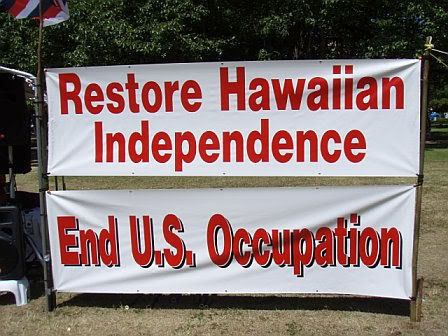
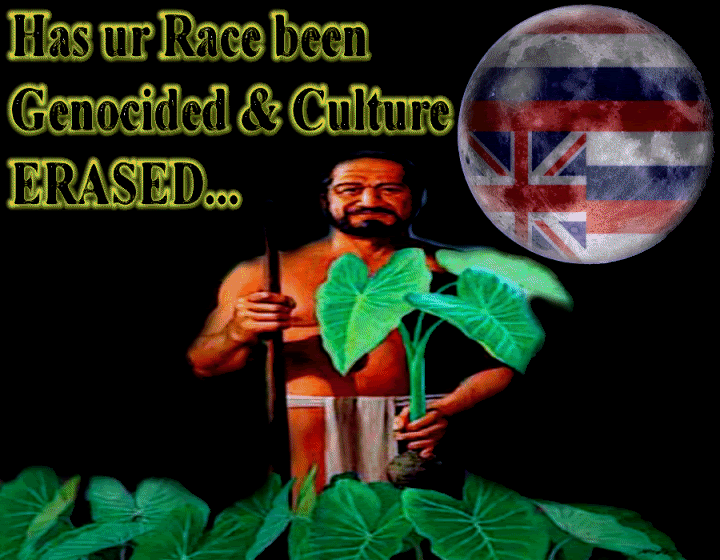
TWO OPINION EDITORIALS ON THE INCOME AND PROCEEDS SETTLEMENT : DANNERWhat's wrong with paying X amount temporarily during an interim period without all the 'strings attached'? The lands in question is over-inflated. Why didn't they use the fair market value rather than the potential revenues it 'could' obtain minus the cost of restoration and repair of the land and buildings which are on those lands? Why are they stating the right of way to the shorelines? That's a given for ALL properties along the shoreline; how much have the state kept open? The state had an obligation since 1959 and only adjusts revenues since 1978. Cute! So meanwhile, since there is no established inventory nor dollar amount of the 20% established, Sale of ceded alnds and land swaps of ceded lands, they should put a hold on a settlement until ALL of the inventory and revenues are settled. They should set an amount as an advance of what they already owe to be deducted from what they are liable to owe. They need to be impressed that the Hawaii Nationals are alive and well and they cannot sell off our lands. The dollar a year lease to the governments and military must be rescinded and a new lease with the conditions of complete land restoration should be included and the protection of our sacred sites be preserved. There should be no toxic waste-dumped on the premises, etc. Abuse of property is cause for eviction. Now that's justice and a correct thing to do. Hawaii Nationals should have the ability to live on those lands as well. All these shenanigans must stop and it's time to pay the piper! If the state cannot do its job properly, then it's time to change the trusteeship back to the Hawaii Nationals, Not to OHA nor the US government or any of its agents.
Simple! So what's the problem?
TanePosted on: Sunday, March 23, 2008 COMMENTARY
Hawaiians' priorities, not expediency, must matter in settlement
By Robin Puanani DannerThe ceded land trust consists of roughly 1.2 million acres of lands, submerged lands and harbors that were ceded by the federal government to the state under section 5(f) of the 1959 Hawai'i Admissions Act as a public trust. There are five purposes of the trust proceeds, one of which is bettering the conditions of native Hawaiians as defined by the Hawaiian Homes Commission Act of 1920. In 1978, the Office of Hawaiian Affairs was created as a state agency under Article XII to administer the ceded lands revenues dedicated to this obligation. The governor, the Legislature and the courts all agree the state's OHA has not received a proper share of the revenue. The only questions left are the terms and purpose of the settlement.
I applaud Gov. Linda Lingle and OHA for their leadership in taking up this longstanding issue, but process and inclusion matter, and what is important to Hawaiians must matter. The Legislature should not hastily approve this settlement for the sake of settling, or political or monetary expediency, or simply because it has been an issue for 30 years.
The opportunity here is much bigger. Hawaiians and our great state deserve a different future over our difficult past. It will come from a different approach. We cannot start the dialogue when the ink on a settlement agreement has dried; we must resolve to reach an agreement that accounts for what the beneficiaries of the ceded land trust value most. Without consultation, we cannot know if this agreement contains their priorities at all. Expediency is not the center of the bull's-eye, and settlement terms that flash a number and call out 'This is your last chance, take it or leave it' is not how we achieve the very different future we see for ourselves as Hawaiians or as a state.
There are more than 200 years of native history of this kind of deal-making, here and in every state in the country. Under circumstances that are only defined by the measurements and consumption models of unrestrained capitalism, we have not fared well, nor has the stewardship of our island home as a result. Both hang in the balance of what we do differently now. We must not make decisions with insufficient time for due diligence. We must not accept being the last to know and having no opportunity to establish what our collective beneficiary priorities are in order to guide the priorities of an agreement at the beginning. We must not accept that fear of lost dollars and cents is the place where our deliberations begin. If we do, we rob our state of the Hawaiian ingenuity and energy toward developing long-lasting solutions to our state's most complex challenges.
I don't subscribe to these circumstances, and I don't subscribe to the notion that $13 million-plus land is the only answer to a 30-year question based on them. We haven't asked the right questions of the very beneficiaries we say this settlement supports, especially our homestead communities. We haven't asked, 'What are your priorities in your communities, given the condition of your island homeland and the future you are reaching for? Will $13 million in cash and land at Kaka'ako, Hilo Bay and Kalaeloa meet them?' What is important to Hawaiians must matter in this settlement and in the administration of this trust, lest it be just another expedient deal, and not the fulfillment of priorities we know for ourselves must be achieved. Process and inclusion matter.
Going forward there are three actions the state should consider:
1) Agree to the completion of a ceded lands inventory. Regardless of whether lands are idle or generating income, this is a prudent data point for the trust and state to have and publish. Reasonable people would not agree to sell the contents of the family home without taking an inventory.
2) Coordinate well-planned consultation sessions over the next nine months, versus the past six weeks, to provide beneficiaries with comprehensive data by which to fully evaluate the agreement, and submit a report to the Legislature in 2009.
3) Specifically reach out and identify the priorities of beneficiaries of the Hawaiian Homes Commission Act on this settlement and in general. Beneficiary organizations are long standing and well known to the state and OHA, easily and readily available for consultation. Designate a representative from the Hawaiian Homes Commission to participate in any negotiations.
Settlement agreements of this nature, involving a public trust containing the collective assets and resources of the Hawaiian people, must pursue equitable value based on a set of priorities, and a reconciliation that respects the knowledge of those most impacted. Our trust will survive the time necessary for due diligence, and a thoughtful evaluation by the Legislature and the beneficiaries of the trust.
Robin Puanani Danner is the CEO of a Native Hawaiian community development nonprofit, is a former bank executive, and lives on Kaua'i. She wrote this commentary for The Advertiser.
Killing best hope for resolution isn't pono; we've waited 30 years
By Haunani Apoliona and Mark J. Bennett
On March 17, three Senate committees decided that instead of increasing the Office of Hawaiian Affairs' asset base by approximately $200 million ? almost 50 percent ? OHA will instead get nothing this year for what is past due. We disagree with this decision.
In 1959, through the Hawai'i State Admission Act, the United States transferred approximately 1.4 million acres of crown and government lands of the Kingdom of Hawai'i ? also known as ceded lands ? to the state.
The Admission Act required Hawai'i to hold 1.2 million acres and their income and proceeds as a public trust for one or more of five purposes, including supporting public schools, making public improvements, developing home ownership, bettering the conditions of native Hawaiians, and providing lands for public use.
OHA was created by the 1978 Constitutional Convention in part to receive a portion of income and proceeds from the ceded lands. The Legislature was responsible for determining and specifying how much was to go to OHA.
Since 1980, the Legislature has passed laws to spell out OHA's portion and the method of calculation; however, the Hawai'i Supreme Court has said that the legislation was so imprecise that the total amount to be paid to OHA cannot be accurately determined.
The court made clear that it is the responsibility of the Legislature to decide how much is to be paid. Sadly, that never happened in a way that allows this issue to be put to rest. As a result, the amounts have been the subject of divisive lawsuits for 30 years.
The Lingle administration, like previous administrations, has attempted to agree with OHA on income and proceeds amounts to be paid to OHA dating from 1978. Since 2003, we have informed the Legislature that we would attempt to negotiate this issue.
In 2008, the state and the OHA trustees came to a proposed resolution of the disputed amount of the income and proceeds from the ceded lands from 1978 to the present to be paid OHA. The proposed settlement provides about $200 million in land and cash to OHA (since 1978, OHA has received about $430 million in income and proceeds). OHA methodically selected land that would provide both income and growth. In addition, OHA would receive a minimum of $15.1 million per year in the future with the provision for legislative reexamination. The lowest annual payment OHA has received is $0, when Gov. Ben Cayetano suspended all payments; the highest is $15.1 million.
The House found the basic terms fair, but reminded us that the Legislature was not a party to any settlement and that the final decision was one of policy for the Legislature. The House passed a bill with which we agreed.
The Senate president introduced a resolution, adopted by the Legislature, requesting that OHA and the attorney general conduct statewide informational meetings, solicit input, and provide a report to the Legislature by March 26, 2008. We took this very seriously and spent many hours listening and discussing this matter at more than 40 meetings throughout Hawai'i.
The Senate's three committees, however, did not even wait for our report to be filed before making their March 17 decision.
While many comments were received from the more than 1,400 attendees at these meetings, not a single person who spoke suggested that Hawaiians were due nothing from the state for these past amounts.
Some felt the waiver language was too broad. OHA and the state, however, did not negotiate or resolve any issue other than the disputed amount of the income and proceeds from the ceded lands from 1978 to the present to be paid OHA, and the amount going forward ? no other historic grievances of Hawaiians and nothing relating to the 1893 overthrow or to the state's ability to sell ceded lands to third parties. To make this absolutely clear and respond to concerns, the waiver language has been revised.
Some have said that there are unresolved questions. However, during the March 17 hearing, not one senator asked a question of any witness, nor offered any plan or resolution. If there is a Senate plan, it is a secret.
It is not pono to kill legislation that fairly resolves this 30-year-old controversy while failing to offer any alternative. It is not pono to direct us to solicit input and then not even consider our report of the voices we heard before acting.
To those who tell us to continue waiting, our response is that 30 years is long enough. Even if what we propose is not perfect, it is fair, and it is our best hope for resolution, especially given economic trends.
The Legislature will not adjourn for at least another six weeks, and thus the Senate still has an opportunity to act in this legislative session. That would be pono. Leadership involves decision-making that offers solutions, and not just hollow criticism.
Haunani Apoliona is chairwoman of OHA's Board of Trustees. Mark J. Bennett is the attorney general for the state of Hawai'i. They wrote this commentary for The Advertiser.
 { 20 MILION GENOCIDED THRU CIA Black Op's ,Schools Of Asassins ,NATO and UN with USA & UK as the BACKERS !}
{ 20 MILION GENOCIDED THRU CIA Black Op's ,Schools Of Asassins ,NATO and UN with USA & UK as the BACKERS !}

 New World Order - the 4th branch videoNew World Order - Time to blow the coverStop the Genocide on Stolen Aboriginal LANDPLEASE GIVE THIS TO YOUR FAMILY & FRIENDZ ,"WAR" !PEACE WILL NEVER HAPPEN TILL WE MAKE SO!School of AmericasThe Illuminati and the New World Order
New World Order - the 4th branch videoNew World Order - Time to blow the coverStop the Genocide on Stolen Aboriginal LANDPLEASE GIVE THIS TO YOUR FAMILY & FRIENDZ ,"WAR" !PEACE WILL NEVER HAPPEN TILL WE MAKE SO!School of AmericasThe Illuminati and the New World Order





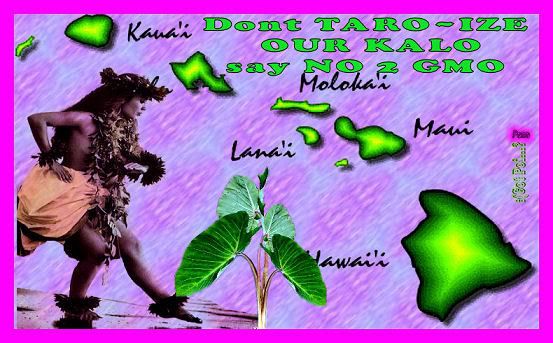

Aloha Kaua!![[image: 6,000 people testify in support of gmo-free taro]](http://salsa.democracyinaction.org/o/2699/images/img_0168.jpg)
Mahalo for taking part in the amazing movement to protect Hawaii's taro.
Over 6,000 people submitted written testimony in support of protecting Haloa. The hearing itself ran for at least 8 hours with more than 100 people offering verbal testimony and 300 supporters visiting the auditorium throughout the day. It was an historic event.
It is now undeniable--the public call for a 10-year moratorium on the genetic modification and patenting of all varieties of taro is overwhelming.
But Haloa still needs your help.
Despite the public's clear call to protect taro in Hawaii, Rep. Clift Tsuji did not pass SB 958 at the close of the hearing. Instead, he deferred decision-making.
If another meeting to pass the bill is not held before April 3rd then SB 958 is condsidered "dead"--so-called "death by deferral.
"
![[image: taro in the audience support moratorium on genetic modification]](http://salsa.democracyinaction.org/o/2699/images/uncle%20walter%20testifying%20loi%20audience.jpg)
A few minutes today could make the difference -- please call key representatives to urge them to pass SB 958 without any changes.
For more about the hearing, visit our blog (www. blog. kahea. org)
Here are the phone numbers to call: ![[image: got representation? testimony in support of gmo-free kalo]](http://salsa.democracyinaction.org/o/2699/images/img_1095.jpg)
Clift Tsuji HAWAII - SOUTH HILO TO KURTISTOWN
586-8480; fax 586-8484; From the Big Island, toll free 974-4000 + 68480 reptsuji@Capitol.hawaii.gov
Tom Brower OAHU - WAIKIKI/ALA MOANA
586-8520; fax 586-8524 repbrower@Capitol.hawaii.gov
Lyla B.
Berg OAHU - KAHALA TO HAHAIONE
586-6510; fax 586-6511 repberg@Capitol.hawaii.gov
Jerry L.
Chang HAWAII - KEAUKAHA TO SOUTH HILO
586-6120; fax 586-6121; From Big Island, toll free 974-4000 + 66120 repchang@Capitol.hawaii.gov
Faye P.
Hanohano HAWAII - PUNA/PAHOA
586-6530; fax 586-6531; From the Big Island, toll free 974-4000 + 66530 rephanohano@Capitol.hawaii.gov
Robert N.
Herkes HAWAII - PUNA TO KONA
586-8400; fax 586-8404; From the Big Island, toll free 974-4000 + 68400 repherkes@Capitol.hawaii.gov
Joey Manahan OAHU - SAND ISLAND, MOKUEA, KALIHI KAI, KAPALAMA
586-6010; fax 586-6011 repmanahan@Capitol.hawaii.gov
Glenn Wakai OAHU - MOANALUA TO SALT LAKE
586-6220; fax 586-6221 repwakai@Capitol.hawaii.gov
Ryan I.
Yamane OAHU - WAIPAHU/MILILANI
586-6150; fax 586-6151 repyamane@Capitol.hawaii.gov
Kyle T.
Yamashita MAUI PUKALANI TO ULUPALAKUA (UPCOUNTRY)
586-6330; fax 586-6331; From Maui, toll free 984-2400 + 66330 repyamashita@Capitol.hawaii.gov
Corinne W.L.
Ching OAHU - NUUANU/ALEWA HEIGHTS
586-9415; fax 586-9421 repching@Capitol.hawaii.gov
Colleen Rose Meyer OAHU - KANEOHE TO LAIE
586-8540; fax 586-8544 repmeyer@Capitol.hawaii.gov


